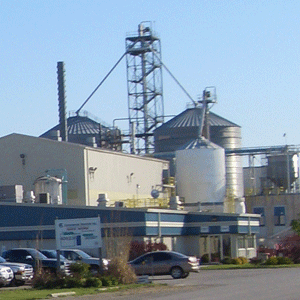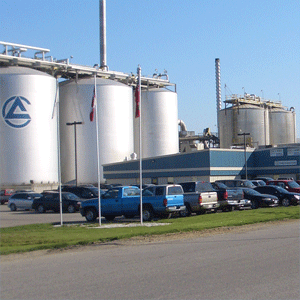Growing North of the Border





October 2, 2006
BY Dave Nilles
Starting up in 1997, Commercial Alcohols' plant in Chatham, Ontario, is Canada's largest fuel ethanol facility. In its lifetime, more than 1.2 billion liters (310 million gallons) of ethanol have flowed from its tanks, using more than 120 million bushels of corn. It's provided both a market for rural Ontario's corn farmers and a steady supply of ethanol for the province's recently enacted ethanol requirement, which is expected to take effect in January.
The Chatham plant is tied closely to Commercial Alcohols' name. The facility produces a range of ethanol-based products, from fuel ethanol to industrial and beverage alcohol. However, after 17 years of existence, the company is changing its name to a more appropriate title, one that signifies the attention it is focusing on its fuel ethanol pursuits. "Now that the fuel side of the business is taking on such an important role, it was time to re-brand and reposition for what the company has become," says Bliss Baker, the company's vice president of corporate affairs since 2004.
While the company's name officially changes Oct. 1, it has already moved forward under the GreenField Ethanol name on several projects being developed in Canada. One project, located in Hensall, Ontario, is a 200 MMly (53 MMgy) plant to be built adjacent to an existing grain-handling facility. Hensall is located near the southeast shores of Lake Huron in southwestern Ontario. The CAN$120 million (US$108 million) plant, which is expected to provide Ontario gasoline marketers with enough ethanol to satisfy the province's new ethanol requirement, will break ground this fall, according to Baker.
The Canadian government's recent move to providing ethanol requirements has inspired Commercial Alcohols to move forward with its ethanol plans. Baker says that with an expected federal ethanol requirement, his company is ideally positioned. "The regulatory market is finally catching up with the United States," Baker says. "This is the reason we're getting ready to become a big player in the North American market."
The company is already well-positioned to take advantage of the new regulations in Canada, as it has produced fuel ethanol for well over a decade. The Chatham plant produces 185 MMly (49 MMgy), with the potential for much more. The facility was designed to incorporate a second-stage expansion, which when completed would increase the design capacity to 300 MMly (79 MMgy).
The Chatham plant is located in far southwestern Ontario, just east of Detroit and roughly straight north of Cleveland across Lake Erie. The city of 110,000 is technically the Municipality of Chatham-Kent, a distinction formalized in 1998 with the amalgamation of the county of Kent and the city of Chatham.
The plant site allows Commercial Alcohols to utilize mostly Canadian corn. However, grain can be brought across the border from Michigan and Ohio. The Hensall project and a facility in operation in Tiverton will all be located in the province's main corn-producing counties. The company plans to operate three ethanol plants in Ontario, Baker says.
The Tiverton facility has produced 26 MMly (6.9 MMgy) since 1989 using a batch system. The plant is located in an industrial park on the shores of Lake Huron.
Most of the Chatham plant's ethanol is marketed by Sunoco Inc., which holds a long-term contract with Commercial Alcohols for the fuel. Baker says the contract runs through 2008 with a five-year option to extend the arrangement.
Chatham's carbon dioxide is sold to Praxair Inc. While Vogelbusch designed the facility, GreenField Ethanol is now partnering with ICM Inc. on future projects.
Commercial Alcohols is nearing completion of the company's third fuel ethanol facility. A 120 MMly (32 MMgy) plant in Varennes, Quebec, is scheduled for completion in late January or early February.
Another factor that Baker says will help lead GreenField Ethanol is its managerial experience. The company has been working in the Canadian ethanol industry since the late '80s, and Baker previously was president of the Canadian Renewable Fuels Association. In January 2005, Commercial Alcohols was named one of Canada's 50 best-managed companies. "As a company, we have a bench strength that we can easily transport to new plants," Baker says. "It's part of our strategy. We've always been a little top-heavy in our plants in terms of experience. We're going to take that to new projects."
The Chatham plant is tied closely to Commercial Alcohols' name. The facility produces a range of ethanol-based products, from fuel ethanol to industrial and beverage alcohol. However, after 17 years of existence, the company is changing its name to a more appropriate title, one that signifies the attention it is focusing on its fuel ethanol pursuits. "Now that the fuel side of the business is taking on such an important role, it was time to re-brand and reposition for what the company has become," says Bliss Baker, the company's vice president of corporate affairs since 2004.
While the company's name officially changes Oct. 1, it has already moved forward under the GreenField Ethanol name on several projects being developed in Canada. One project, located in Hensall, Ontario, is a 200 MMly (53 MMgy) plant to be built adjacent to an existing grain-handling facility. Hensall is located near the southeast shores of Lake Huron in southwestern Ontario. The CAN$120 million (US$108 million) plant, which is expected to provide Ontario gasoline marketers with enough ethanol to satisfy the province's new ethanol requirement, will break ground this fall, according to Baker.
The Canadian government's recent move to providing ethanol requirements has inspired Commercial Alcohols to move forward with its ethanol plans. Baker says that with an expected federal ethanol requirement, his company is ideally positioned. "The regulatory market is finally catching up with the United States," Baker says. "This is the reason we're getting ready to become a big player in the North American market."
The company is already well-positioned to take advantage of the new regulations in Canada, as it has produced fuel ethanol for well over a decade. The Chatham plant produces 185 MMly (49 MMgy), with the potential for much more. The facility was designed to incorporate a second-stage expansion, which when completed would increase the design capacity to 300 MMly (79 MMgy).
The Chatham plant is located in far southwestern Ontario, just east of Detroit and roughly straight north of Cleveland across Lake Erie. The city of 110,000 is technically the Municipality of Chatham-Kent, a distinction formalized in 1998 with the amalgamation of the county of Kent and the city of Chatham.
The plant site allows Commercial Alcohols to utilize mostly Canadian corn. However, grain can be brought across the border from Michigan and Ohio. The Hensall project and a facility in operation in Tiverton will all be located in the province's main corn-producing counties. The company plans to operate three ethanol plants in Ontario, Baker says.
The Tiverton facility has produced 26 MMly (6.9 MMgy) since 1989 using a batch system. The plant is located in an industrial park on the shores of Lake Huron.
Most of the Chatham plant's ethanol is marketed by Sunoco Inc., which holds a long-term contract with Commercial Alcohols for the fuel. Baker says the contract runs through 2008 with a five-year option to extend the arrangement.
Chatham's carbon dioxide is sold to Praxair Inc. While Vogelbusch designed the facility, GreenField Ethanol is now partnering with ICM Inc. on future projects.
Commercial Alcohols is nearing completion of the company's third fuel ethanol facility. A 120 MMly (32 MMgy) plant in Varennes, Quebec, is scheduled for completion in late January or early February.
Another factor that Baker says will help lead GreenField Ethanol is its managerial experience. The company has been working in the Canadian ethanol industry since the late '80s, and Baker previously was president of the Canadian Renewable Fuels Association. In January 2005, Commercial Alcohols was named one of Canada's 50 best-managed companies. "As a company, we have a bench strength that we can easily transport to new plants," Baker says. "It's part of our strategy. We've always been a little top-heavy in our plants in terms of experience. We're going to take that to new projects."
Advertisement
Advertisement
Upcoming Events





